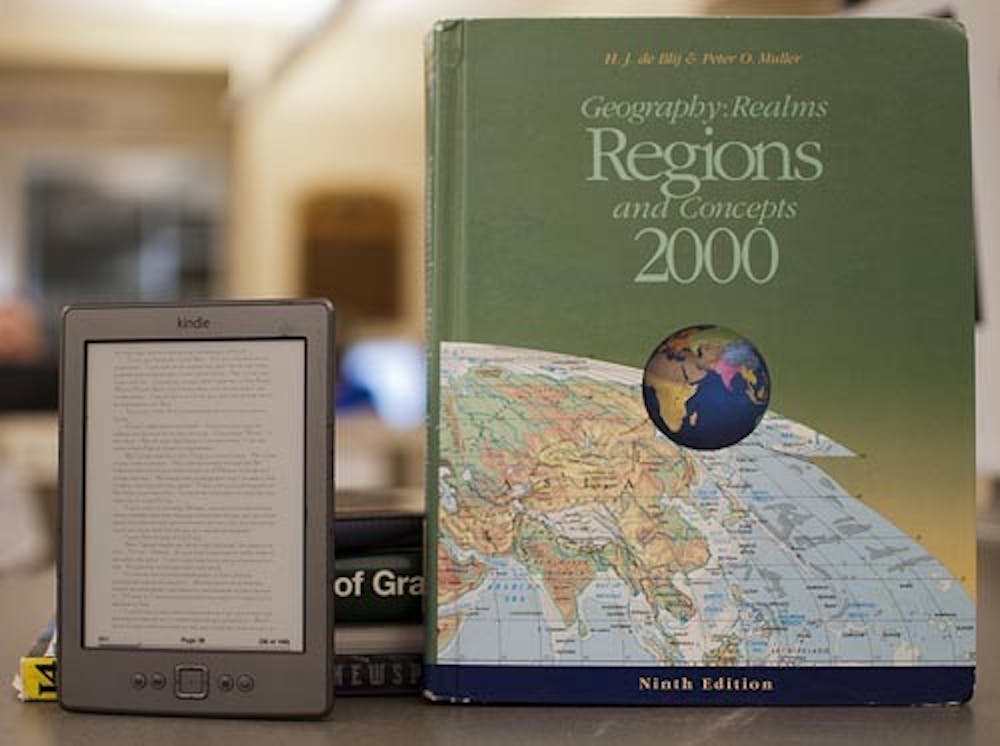According to Simba Research, the overall market for digital course materials like online textbooks is projected to grow five times faster than the market for print materials, potentially totally $1.6 billion by 2014, making online textbooks a major player in the future of higher education.
Cindy Clarke, vice president of marketing at CourseSmart, an online renter of e-textbooks and digital course materials, said the growth of e-textbooks has been fueled by the rise in tuition prices, the proliferation of campus WiFi networks and the importance of technology in student’s lives. CourseSmart has seen significant growth in sales each year since 2008.
“Students are relying more and more on technology and they see it as a vital part of their daily lives,” Clarke said. “The average student uses up to three digital devices every day. It makes sense that these students will migrate towards e-textbooks, just as they have gravitated to other electronic content.”
Freshman education major Jessie Keith said she prefers to purchase online textbooks over the traditional method. She used many digital textbooks in high school, and this semester purchased both the print and online version of one textbook for a class.
“[Online textbooks] are usually cheaper and I don’t hurt my back lugging them around every day,” Keith said. “But best of all, I love how digital textbooks allow you to search for words and phrases — that can be so helpful while studying or writing for those classes.”
Although the industry is growing and e-books have some exclusive features, only 11 percent of college students have purchased online textbooks, according to a study from market research firm Student Monitor.
T.I.S. College Bookstore general manager Pam Suminski said T.I.S. does not sell a lot of e-books, which leads her to believe students prefer the traditional option.
For every textbook that has an e-book option, TIS carries the e-book code right next to the text version so students have the choice.
Matt Montgomery, Ball State alum and president and CEO of ecampus.com, an online retailer of textbooks both traditional and online, also said that his company does not sell many e-textbooks, making up less than 10 percent of total textbook sales.
He thinks that in the future, e-textbook’s percentage of sales may surpass conventional textbooks, as today’s kindergartners, who grew up learning with technology, will prefer e-textbooks. For now, students seem to prefer the hard copies.
“There is a cultural difference with students,” Montgomery said. “I can buy a textbook and it has value whether I trade or sell it back. I can get residual money at the end of semester. With an e-book, the subscription expires and you have a usage fee. At end of semester it evaporates.”
Junior information systems and operations management major Joe Kaufeld said he liked using an e-book because it is convenient for his Kindle, but that downside was enough to push him back toward traditional books.
“I bought an e-book once and then regretted it and never bought another,” Kaufeld said. “Yes, I liked it more than a regular book, yes, it worked better for me — but you can’t resell e-books.”
According to an independent study published by ecampus.com, 54 percent of college-student respondents said “maybe” they would buy an e-book over a regular book, depending on the class.
Junior hospitality and food management major Susan Grilliot sees both the pros and cons of e-textbooks.
“I prefer a physical copy because I feel more free to study wherever whenever, but if the online is cheaper and I don’t want to keep the book, I choose to buy the online version,” she said.
Charles Schmidt, director of public relations for the National Association of College Stores, said he sees in NACS’s 3,000-member college stores, e-textbook sales make up only three to four percent of course material sales.
NACS conducts an On Campus Student Watch research study every two years and in 2012, they found 77 percent of college students preferred the print version of a book.
Schmidt said he thinks students are nervous of the new technology, faculty are not yet comfortable with it and the e-textbook industry needs to advance before it can gain on print.
“Students want a more interactive experience [before they] pay up for an e-book,” Schmidt said. “When you’re online, you’re expecting to click things and do neat stuff. Students are trying to get more bang for their buck.”
Schmidt, along with Clarke and Montgomery, predicts e-textbook sales will increase in popularity, potentially surpassing conventional books in the future.
“We anticipate e-book sales increasing in the future,” Schmidt said. “People think going digital saves money and it will come where they are more popular when students become more comfortable. They are not the silver bullet right now. They are not taking over the textbook market, yet.”


